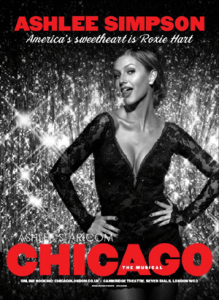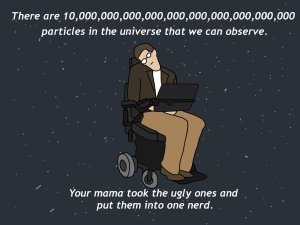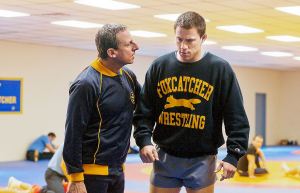I don’t deal well with not being able to fix things. Problems affecting me or someone close to me that I can’t personally address weigh on me something terrible. Right now it’s internet shenanigans, plumbing issues (is that who fixes garburators? Plumbers? I don’t even know), technical problems on Ye Olde Webseries, stalled career issues, all hitting a general sense of malaise.
What I’d love is something great to happen to counter-act all of this, but since that doesn’t seem to be on the horizon, instead I’m going to talk about movies I’ve seen recently, something that’ll be happening more and more as we head towards Oscar night.
In no particular order…
BIRDMAN or The Unexpected Virtue of Ignorance
The story of a Hollywood actor, best known for the superhero movies he did 25 years ago, trying to revitalize his career by writing, directing, and starring in a Broadway play. You’ve probably heard about it, since it stars Michael Keaton, who as you may recall had some superhero experience himself 25 years back, before there were three or four superhero movies a year to choose from.
There are so many fascinating things to pick apart here. There’s the fact that, despite taking place over several weeks, virtually the entire movie is shot as though it were a single take. There are the brilliant performances from Keaton, Edward Norton as his supporting actor who’s brilliant onstage but a nightmare to work with, Emma Stone as Keaton’s estranged daughter, and more. There’s the way it attacks Hollywood stars for thinking of live theatre as a holiday gig they can do between films, yet has a repugnant character make that argument so that they can also attack Broadway for thinking they’re above it.

Plus the fact that I’m still not entirely certain what happened in the final minutes, where the line is drawn between Keaton’s growing delusions and reality, though I can’t really go into that without spoiling stuff, so… just watch it. Watch it so we can talk about it.
The Hobbit: The Battle of Five Armies
A year back I wrote about some of the challenges of adapting the Hobbit into film. And yes, at the time, I stood by some of Peter Jackson’s choices, including adding female characters, showing what Gandalf was up to instead of having him pop in and out of the story almost at random, and having the dwarfs be a little less helpless. But there is one choice made that I can’t support, and that is where the Desolation of Smaug ended and Battle of Five Armies begins. Ending the second movie where they did, with Smaug about to attack Lake Town, was stupid. Because that isn’t an ending. The action beat enters its second phase, and they roll credits. That’s bad narrative so matter how you slice it.
That said, once you get past the fact that Battle of Five Armies starts with what should have been the last 15 minutes of Desolation of Smaug, the actual Battle of Five Armies is worth watching. If you disagree with any of the choices made to pad out the fairly simple story of the book into three movies, this won’t bring you around, but the brinksmanship between gold-mad Thorin and the lurking armies of elves and men who feel they’re owed a piece of the hoard is well done, and when the orcs roll up, Jackson proves he still has some gas in his “epic battle” tank.
There’s really only one other thing to say here, and that’s to address one more novel vs. movies complaint: that we spend basically an entire movie (again, once the rightful end of the last movie is done) on something that lasts less than a page in the book. Well, to this I say something that will likely bring the wrath of my Tolkien fan friends down on me…
There are things that Tolkien wrote that needed to be changed.
Arwen needed a bigger part in the Lord of the Rings movies because if you want audiences to care about her relationship with Aragorn she can’t just be a background decoration like in the books, and by the same token, the Battle of Five Armies can’t really be the quick little epilogue that it was in the book.
In the book it’s this quick little skirmish in which the elves, dwarfs, and men are forced to team up against the attacking goblins to teach a lesson about the futility of war and lust for gold. It’s quickly skimmed over because the lesson is more important than the details. But the problem with that, you see, is that several of the dwarfs die in the battle, even in the book. Either the Battle of Five Armies is this little epilogue to the larger story not worth expanding, or it’s how several main characters die, but it cannot be both.
So the Battle of Five Armies doesn’t justify turning one short children’s book into three lengthy movies, but it does justify spending two hours on the battle itself, and makes it worth watching. Well, except that scene where the Mirkwood elf king tells Legolas that he should find this ranger going by the name of Strider. Come on, man. We KNOW. We GET it. There was no need for that.
Anyhoo, since it’s Oscar season, time to talk about some Inspirational Biopics™.
The Theory of Everything

One night, at a party at Cambridge, a girl named Jane meets a boy named Stephen. They hit it off, and Stephen pursues her, but their relationship hits a few snags: she’s a devout Christian, and he’s a brilliant physicist with an annoying habit of trying to disprove the need for God. Oh, also he has a debilitating neural disease that’s slowly shutting down his body.
The Theory of Everything, while a biopic about Stephen Hawking, is not about Hawking’s work in physics. Well, it is a little. That’s a big enough part of his life that you can’t really skip over it. But the heart of the movie is the relationship between Stephen and Jane: the religious debate that divides them, the debilitating illness that makes their lives harder and harder. And Jane’s growing friendship with church choir director Jonathon, who might be a perfect match if she weren’t already married.
Eddie Redmayne does an excellent job portraying Stephen’s long, slow slide into a weirdly non-lethal case of ALS, conveying his emotions even after he’s lost the power of speech. The movie really makes you feel for both Stephen and Jane, and the sense that however much they love each other, the marriage eventually becomes something neither of them ever signed on for.
The one thing I would have liked that wasn’t there is a potential debate between atheist Stephen and spiritual Jane on the topic that no one except John Stewart seemed to be asking… when Stephen was diagnosed, his life expectancy was two years. That was over half a century ago, he’s still going, and nobody knows why. Stephen’s always been too busy an not interested enough to look into it. Maybe his religious wife never asked the question in real life, but I’d have liked to have seen that moment.
On the other hand, probably wouldn’t have advanced the story much and would have been cut. Oh well.
The Imitation Game
Switching now from the British physicist biopic to the British mathematician biopic. Benedict Cumberbatch plays Alan Turing, who broke Nazi Germany’s unbreakable Enigma code, shortening World War II by two years (historians estimate) and saving millions of lives, then had his life destroyed by his own government when he was outed as a homosexual. Uplifting!
There are flashbacks to his childhood, and flash forwards to the police inquiry that outed him, but the main focus of the movie is Turing’s quest to beat Enigma not through conventional codebreaking, as the rest of his team and employers wish he would, but by building a machine capable of beating the code. In essence, Turing won the second world war by inventing computers. Or by making a substantial breakthrough in computer technology if you hate drama.
The film paints Turing as a perpetual outsider, loathed by his colleagues. Not because he was secretly gay, but because he was what we’d now recognize as on the autism spectrum (obviously I cannot verify if that’s true, but that’s clearly what the movie claims). Clueless at social nuance but brilliant at puzzles, he struggles just as hard to win over his co-workers as he does to build his machine and make it work.
Benedict Cumberbatch is going to give Eddie Redmayne a run for his money in the best actor category, I can tell you that. Although there are still other biopics in play, so who knows who’ll be on top? Could even be Steve Carell.

Ready for your biopics to get less inspirational?
Unbroken
Theoretically, Unbroken is an inspirational biopic about the triumph of the human spirit. I say “theoretically” because the only word of that I actually agree with is “biopic.” Well, and “is,” I guess.
See that trailer I posted up above? Watch it and you’ve basically seen the whole movie. Louis Zamperini uses track and field to stay out of trouble as a kid, competes in the 1936 Berlin Olympics (setting a record for fastest lap but not winning a medal), enlists in the air force, crashes at sea, spends a month and a half in a lifeboat, is captured by the Japanese, and has a pretty crap time of it. And manages two or three acts of defiance and resilience, most of which are in the trailer. Takes a beating from fellow prisoners to protect other prisoners, lifts a heavy piece of wood until his tormentor is sad, and thus is Unbroken or whatever.
And the end result is Just. So. Boring.
Seriously, you hit a point of diminishing returns on “Wow, he endured a lot,” and that point happens before he even reaches the POW camp. The lifeboat gets dull. The cruelty of the head of his POW camp gets old in a hurry. But my real issue? All the other big biopics this year are about people who did something. Martin Luther King Jr., Alan Turing, Stephen Hawking, even the guy from Foxcatcher was trying to do something of note. Louis Zamperini just endured something. He didn’t inspire his fellow prisoners to keep hope (in the end they all march quite willingly to their almost certain death, only to be saved by a US plane flying overhead causing the guards to decide executing their prisoners might not be as good an idea as they’d been told), he didn’t escape, his only accomplishment was not dying. A lot of people in the same camps managed to not die. Only one of them got a movie.
The spiritual journey Zamperini went on after the war, which led him to forgive his captors (the worst of which escaped war crime charges due to an amnesty offered by the US to smooth US/Japan relations) might have made the story worthwhile, but all we eventually got was “This guy had a crap three years but didn’t whine about it much, isn’t that inspiring.”
No. It wasn’t.
So feel free to skip this one and watch Big Hero Six instead. I like Big Hero Six.
Next time… a probable return to old plays, as there’s some relevance to my current goings-on.

